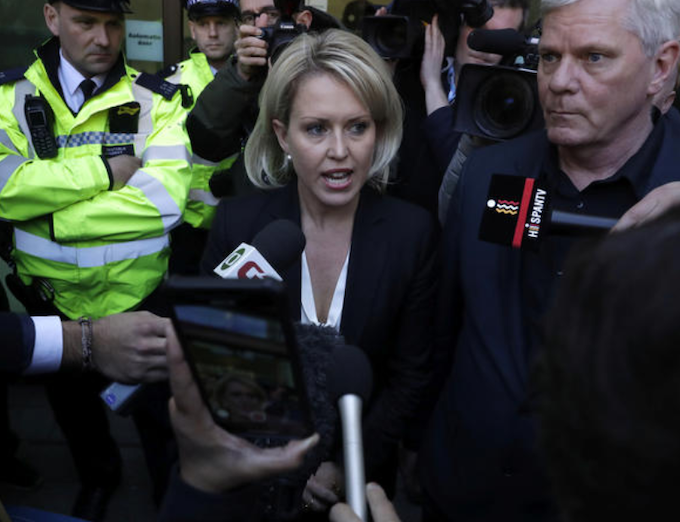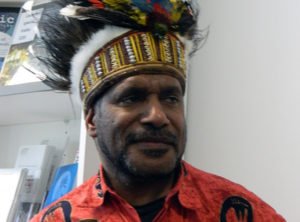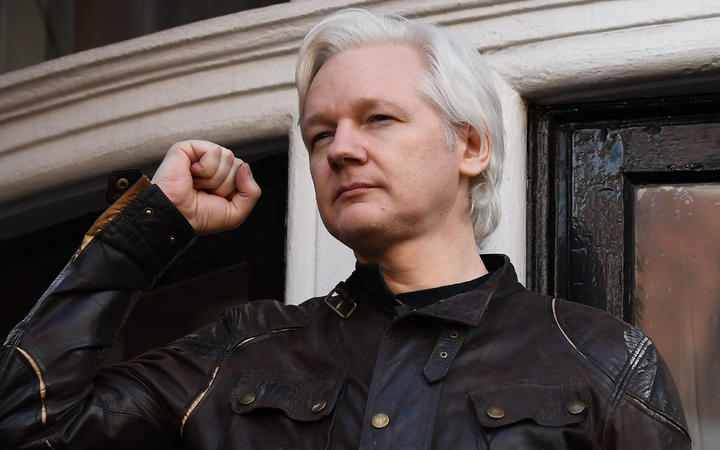
RNZ Saturday Mornings with Kim Hill
Australian human rights lawyer Jennifer Robinson has been described as the go-to barrister for London’s rich and famous.
Standing by her clients WikiLeaks founder Julian Assange and US actress Amber Heard in the full glare of international media, she is based at a top London law firm Doughty Street Chambers.
Originally from the small town of Berry, NSW, Jennifer Robinson also has a long-term commitment to independence for West Papua and works with human rights activist Benny Wenda.

Her latest mission is to improve educational opportunities for public school children. She recently founded the Acacia Awards, in association with the Public Education Foundation in Australia.
Prominent people who were educated in the public system will sponsor a student from their former school or area, providing mentorship and a small scholarship.
Robinson isn’t from a privileged background and attended Oxford on a Rhodes Scholarship. She tells Kim Hill the Acacia Awards would have benefitted someone like her as a child.
“Mentorship and some financial support would’ve been a huge help. When I was at school, I didn’t see any lawyers in my local community or have anyone I could speak to about it being a potential career. In fact, really looking around I couldn’t see anyone who went to my high school who was off doing anything, at least not that I could see.
“Representation is really important and showing kids from schools like where I came from and public schools around this country what’s possible for them from a public education is really important to show them the amazing opportunities.”
Private school education offers children and young adults access into a privileged network that can set them up for their careers, Robinson says.
“That’s basically what I want to get out of the Acacia Awards, to create networks of support and mentorship for kids from public schools to connect them into worlds, to connect them to people who are doing what they want to do, who can potentially give them advice and perhaps introductions to people they need to know.”
Robinson says her time in West Papua opened her eyes to what happens when government can control a narrative and is why she believes in the cause of WikiLeaks which has uncovered injustices and travesties which would otherwise have been hidden from sight.
She first met Julian Assange in 2010 and has been his lawyer for more than ten years now. On first meeting, Robinson says she was struck by how serious and well-informed he was.
“I’d just come from a TV or radio interview about West Papua and I mentioned that to him and we had a really long conversation about geopolitics in the region, West Papua’s history, Indonesia occupation and I was struck by how well-informed he was. Little did I know he had probably been reading the US diplomatic cables the whole time.
“I was struck by him and I still am. He’s a very brave, intelligent, committed person who has contributed a huge amount to journalism, to human rights accountability, and he himself has been nominated for the Nobel Peace Prize for consecutive years since 2010 because of those [WikiLeaks] publications.”

Robinson says people need to be reminded of the importance of what WikiLeaks revealed, including the war crimes of US military shooting down journalists and civilians in Iraq – which had been covered up. The Iraq and Afghanistan war logs also showed civilian deaths far higher than originally thought and included evidence of torture and war crimes.
She says many of the cables published by WikiLeaks have been used in human rights cases in courts, including cases she has taken.
“These publications are immensely important, and he faces 175 years in prison in the United States for those publications. The injustice of it could not be more stark so I think it’s really important people remember this.”
One of the accusations levelled at Assange and WikiLeaks is that publishing the documents unredacted risked harm for people, but Robinson says that has never been backed up by evidence and, thus far, no harm came to anyone as a result of the publication.
“That material had already been published online by other publications as a result of a security breach by the Guardian newspaper. The decision by WikiLeaks to publish that material unredacted was because it was already circulating online.”
Robinson says she and other partners at the firm worked through the WikiLeaks material and the extradition case has allowed them to set the record straight on accusations that they simply publish material obtained or given to them.
“That is simply not correct; there are security and verification procedures we take with every publication.”
She says the WikiLeaks story has not been told correctly in the media and the media has a huge obligation to get it right.
“What astounds me about the WikiLeaks story and Julian Assange’s position is that journalists don’t see their own self-interest in getting it right and not putting out further misinformation that creates more difficulties for Assange as a persecuted journalist who’s been under some form of restriction for more than a decade.
“The precedent being set will be used against other journalists and we’re seeing it happen. We’ve seen it here with the raids on the ABC publishing evidence of war crimes in Afghanistan. I think journalists have an obligation to get this right and properly inform the public.”
On the January 4, Robinson won the case against extradition for Assange, but she says it was the right outcome for the wrong reasons.
“The judge found against us on all the free speech arguments that we made and simply chose to discharge him and refuse his extradition on particular medical grounds, those being that Julian – and this is not a surprise to any of us that have worked with him – diagnosed with Asperger’s. He also has severe depression as a result of the past decade and the prospect of what he might face if extradited to the US.
“The terrifying thing about that judgement is that any journalist working in the UK who publishes truthful information about a foreign power could face prosecution and extradition for publishing that information. That is a terrifying precedent.”
The judge in that case refused a bail application and Assange remains in prison in southeast London pending the US appeal against the judgement which will be heard later in the year. The Obama administration chose not to proceed with extradition because of the free speech implications and potential blowback and Robinson suspects the Biden administration might take a similar tack.
“We know the free speech risk. We now know that Julian’s health and life is at risk and it’s time for this case to be put to an end.”
Liberal sympathies for Assange may have been turned during the course of the 2016 election where it was argued his publication of DNC emails helped Donald Trump’s cause, but Robinson points out that other organisations, such as ProPublica, published the material and the New York Times said they would have if they had received it.
“When sued by the Democratic Party, the judge found that the material about the Party and Hillary Clinton was of the highest public interest in the context of an election. WikiLeaks has an editorial policy that, if they receive material they can verify and is in the public interest, they will publish it. Had they received Trump’s tax records, they would have published it in the context of that election, so the principle remains the same.”
Assange is now such a polarising figure that Robinson herself has been attacked and harassed for her association with him.
“As a lawyer, we have an obligation to represent our clients to the best of our ability and no lawyer should face any blowback or repercussions because of the clients they represent. Unfortunately, that’s not been the case for me. I’ve been stopped in airports and I’ve had threats.
“It has been polarising so there is some blowback but, on the flipside, I’ve had a huge amount of support from within the profession and I think people respect the work that I’ve done over a long time in a very difficult case.”
While Robinson can’t say much about the Amber Heard and Johnny Depp situation because of the case she faces in the US, brought by Depp, she says she and Heard faced significant blowback from it too – despite Heard being a witness in the case, not the litigant or defendant. She says Heard has faced public backlash even worse than Assange.
“There’s been a concerted campaign against Amber over a number of years because she’s stood up and spoken out about what’s happened to her. She still faces a $50 million defamation suit in the United States… it is disappointing to me the level of vitriol that’s been thrown at her.
“I think we need to ask questions about how society, when women who put their hand up and speak out about their experiences of domestic or sexual violence, face that kind of online and in person attacks. When we were coming in and out of court, we had police security because people were throwing things at the car and shouting at her. It was really offensive and upsetting.”
This article is republished under a community partnership agreement with RNZ.













































